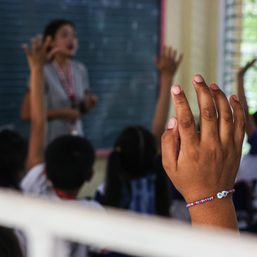SUMMARY
This is AI generated summarization, which may have errors. For context, always refer to the full article.

MANILA, Philippines – President Ferdinand Marcos Jr. said on Friday, July 5, that the K to 12 program didn’t result in better employment prospects abroad for Filipino graduates, underscoring the need to review the Philippines’ basic education curriculum.
“Ginawa natin ‘yung K-12 dahil hinahanap ang years of training sa ating mga nag-a-apply, at sinasabi dito sa Pilipinas, kulang dahil 10 years lang, kailangan 12 years,” Marcos told reporters on the sidelines of the distribution of assistance to farmers and fisherfolk in Sulu.
(We launched the K to 12 program because employers abroad ask Filipino job applicants about their years of training, and they say that in the Philippines, we only had 10 years when the requirement was 12.)
“Pero kung titingnan natin ang naging resulta, hindi tumaas, hindi gumanda ang employability nila. So, we have to do something else. Kaya we were examining things like mini courses, ‘yung mga tatlong buwan, anim na buwan, one year, short courses para sa mga specialty,” he added.
(When we looked at the results, their employability did not improve. So, we have to do something else. We were examining things like mini-courses – three months to six months to one year – short specialty courses.)
The K to 12 program, introduced in 2012 during the administration of the late president Benigno Aquino III, added two years to the country’s 10-year basic education system, with the aim of producing more globally competitive Filipino graduates.
A 2018 study by the Philippine Business for Education noted that only one in every five leading companies across all sectors was open to hiring senior high school (SHS) graduates.
Another study by the Philippine Institute for Development Studies in 2020 said over 70% of SHS graduates pursued tertiary studies, while only 20% immediately joined the workforce.
Before its implementation, the Philippines had been the lone country in Asia with a 10-year basic education system.
Marcos said on Friday that the government was also reviewing why Filipino students were performing poorly in global learning assessments.
“The second part that we are looking at, of course, are the results in the international objective test that we are getting, especially in the STEM subjects, because that’s where we are falling behind, and that is most in demand right now because we’re getting more and more technical,” he added.
The 2022 Programme for International Student Assessment (PISA) showed that the Philippines placed 77th out of 81 countries among 15-year-old learners, yielding a score that was less than the average in mathematics, science, and reading.
There have been calls through the years to suspend the current 12-year education curriculum, and Marcos said during his first year as president that his administration would be conducting a “careful review” of the K to 12.
Marcos’ statement comes as he puts Senator Sonny Angara in charge of the Department of Education after Vice President Sara Duterte tendered her resignation effective July 19. – Rappler.com
1 comment
How does this make you feel?
![[Be The Good] What should the incoming DepEd secretary prioritize?](https://www.rappler.com/tachyon/2024/07/newsletter-sonny-angara-july-3-2024.jpg?resize=257%2C257&crop=298px%2C0px%2C720px%2C720px)



![[OPINYON] Thesis for sale](https://www.rappler.com/tachyon/2024/06/tl-thesis-for-sale-1.jpg?resize=257%2C257&crop_strategy=attention)
![[The Slingshot] Blunders and mess Sara left behind at DepEd](https://www.rappler.com/tachyon/2024/06/TL-Sara-Duterte-DepEd-June-24-2024.jpg?resize=257%2C257&crop_strategy=attention)
![[In This Economy] Duterte exits DepEd: Good riddance!](https://www.rappler.com/tachyon/2024/06/tl-duterte-exits-good-riddance-June-21-2024.jpg?resize=257%2C257&crop=220px%2C0px%2C720px%2C720px)




What will happen to those who have completed the K to 12 education program? Will anyone be held accountable for the time and money lost due to a poorly planned program? It seems unfair for them to endure these losses without any consequences.